Categories
Archives
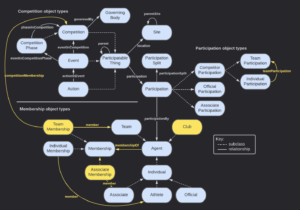
The IPTC Sports Content Working Group is proud to release version 1.1 of IPTC Sport Schema.
Documented at the dedicated site sportschema.org, Sport Schema is IPTC’s semantic web (RDF) based ontology for describing sports listings, results, statistics and even play-by-play actions during any kind of sports event.
Version 1.1 adds the following new features:
- We add a Club type, which can handle the organisation that hosts one or more teams of varying types, possibly across various sports. (Did you know that Bayern Munich has not just the famous men’s, women’s and junior football/soccer teams, but also basketball, handball, table tennis and even chess teams!)
- We also add a TeamMembership type, so a Team can be a member of a Club (and could theoretically move from one Club to another).
- We add support for the concept of “sports facets” that we originated in SportsML. (based on SportsML / NewsCodes facets) so we can now say that an event is “women’s 400 metres relay swimming”, not just “swimming”. The boxing example shows that the weight class of the event is “welterweight”.
- Added the ability to link from Athlete to Team via a new teamParticipation property.
- Add an AssociateMembership type so an Associate (such as a coach) can have a tenure relating to any Agent, including an Athlete or a Team. Previously Associates were linked to Teams via Participation objects which wasn’t satisfactory.
- Expanded and added to examples including a Boxing example showing how the new AssociateMembership type can be used to represent a coach or manager of an individual athlete (in this case a boxer)
- Added new golf ontology taking some properties from SportsML and some from the Golf vocabularies in IPTC NewsCodes. We have merged them together in Sport Schema for ease of use.
- Many cleanups to the SHACL Shapes used for validation of data.
Please take a look at Sport Schema and let us know what you think! We would love to hear about Sport Schema being implemented in real-world projects. Please contact IPTC using the Contact Us form or via the public discussion list at groups.io/g/iptc-sportsml/
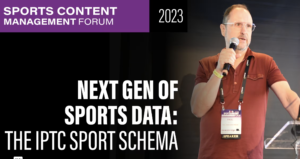
The IPTC Sports Content Working Group is happy to announce the release of IPTC Sport Schema version 1.0.
The first new IPTC standard to be released in more than 10 years, IPTC Sport Schema is a comprehensive model for the storage, transmission and querying of sports data. It has been tested on real-world use cases that are common in any newsroom or sports organisation.
IPTC Sport Schema has evolved from its predecessor SportsML. In contrast to the document-oriented nature of SportsML, IPTC Sport Schema takes a data-centric approach which is better suited to systems dealing with large volumes of data and also helps with integration across data sets.
“We reached out to many companies dealing with sports content and built up a clear picture of their needs,” says IPTC Sports Content Working Group lead Paul Kelly. “They wanted up-to-date formats, easy querying, the ability to handle e-sports and the ability to cross-reference between different media and data silos. IPTC Sport Schema addresses those requirements with a new basic model at the abstract end, and adhering to common use cases to keep things grounded.”
Content in Sports Schema is represented in the W3C’s universal Resource Description Framework (RDF), which renders any kind of data as a triple in the form of subject->predicate->object. Each component of a Sports Schema triple has a reference to an ontology, which defines the model at the heart of the standard. Querying is done using the W3C’s SPARQL standard, a kind of SQL for RDF.
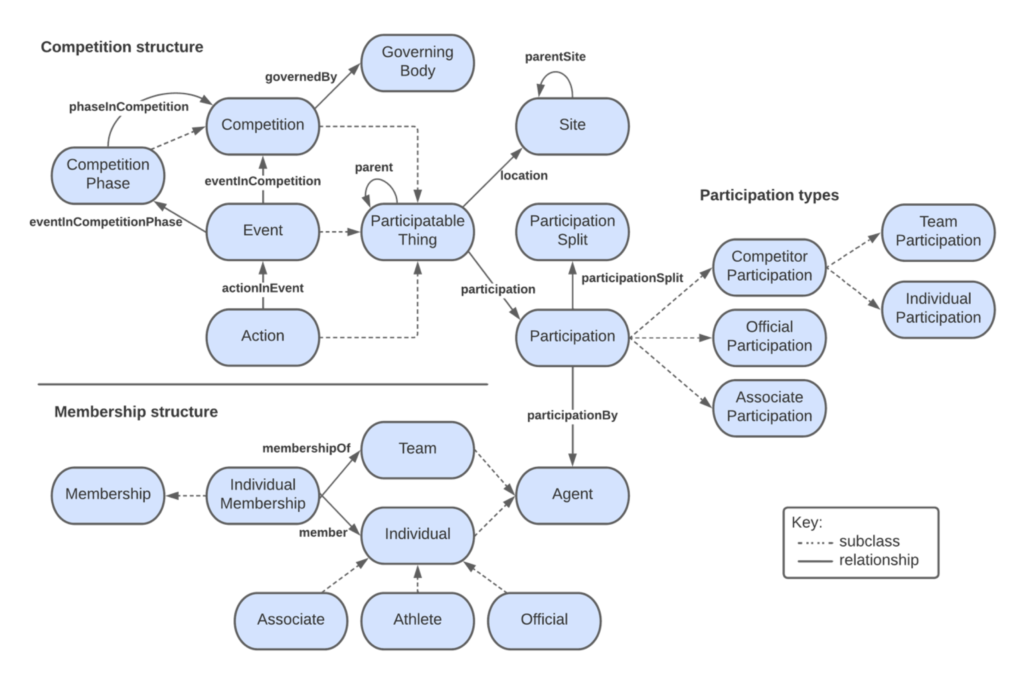
“The IPTC has been working on RDF and semantic web standards for more than 10 years, going back to rNews and RightsML,” said IPTC Managing Director Brendan Quinn. “So we are very happy to release another semantic standard that can help organisations to publish and share sports data in a vendor-neutral, interoperable way.”
Being RDF-based, IPTC Sport Schema can be rendered in XML, JSON and the simple Turtle format, and can be converted easily between all three formats using free tools such as Apache Jena.
“Those familiar with SportsML or SportsJS should recognise the basic components of Sport Schema,” says Kelly, “both in the ontology and in the sports vocabularies introduced with SportsML 3.0, which were designed specifically with semantic technologies in mind.”
To support take-up and share information about the new standard, the IPTC has created a dedicated website, sportschema.org. The site contains:
- a list of use cases which were used to help design the schema and data structures
- example instance diagrams for various sports to help understand how the model can be applied to team, individual and other types of sports
- a data dictionary comparing IPTC Sport Schema to other prominent sport schemas (SportsML, ODF, BBC Ontology, etc.)
- A detailed and comprehensive IPTC Sport Schema ontology reference showing all classes, relationships and properties.
- A tool to validate Sport Schema data using the SHACL format to ensure RDF triples adhere to the specification (equivalent to XML Schema or JSON Schema)
- A tool to covert SportsML documents to IPTC Sport Schema data
- A set of unit tests and sample data files that were used to develop and maintain Sport Schema, including a bespoke unit test framework that ensures our example SPARQL queries continue to satisfy our use cases as the model evolves.
Those wishing to try out some SPARQL queries against some sports data should visit Sport Schema’s query endpoint. It includes example queries showing how to build a team roster, league standings and more from our sample data sets.
For more information on IPTC Sport Schema, see the IPTC’s landing pages on the IPTC Sport Schema standard, the standalone site sportschema.org, or the project’s GitHub repository.
If you are interested in joining those who are working on implementing IPTC Sport Schema in your project or your organisation, we would love to hear from you. Please contact us via IPTC’s contact form.

The video recording of IPTC’s presentation at the Sports Video Group Content Management Forum has now been released.
Paul Kelly, Lead of the IPTC Sports Content Working Group, gave a live presentation introducing the IPTC Sport Schema to participants at the event, held in New York City in July 2023.
Many of those participants have helped with the development and testing of the new model for sports data, including PGA Tour, NBA, NFL, NHL and more.
The full video is now available on SVG’s on-demand video platform, SVG Play.
In the presentation, Paul describes among other things:
- the motivation for the new model
- how it is different from IPTC’s existing sports standard SportsML
- how it can handle sports from tennis to athletics to football to golf and more
- how it might be used by broadcasters and sports data providers to attach sports data to video and other forms of media content
The Sports Content Working Group is now putting the final touches to the schema and its supporting documentation before it is put to the IPTC Standards Committee to be turned into an official IPTC standard.
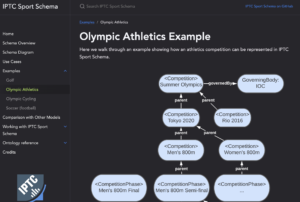
NEW YORK, NY, 26 JULY 2023: The IPTC today announced the beginning of a public feedback and review period of IPTC Sport Schema, which aims to be “the standard for the next generation of sports data.”
The announcement was made by Paul Kelly, Lead of the IPTC Sports Content Working Group, at the Sports Video Group’s Content Management Forum held at 230 Fifth Penthouse, New York.
“The SVG Content Management Forum is attended by senior tech experts from sports broadcasters and sports leagues from the US and around the world, so it is the perfect place to launch the IPTC Sport Schema,” said Kelly. “Many members of SVG have advised us on our work so far, including organisations such as Warner Bros Discovery, NBC Universal, PGA TOUR, Major League Baseball and Riot Games. Presenting our work at their event is a great way to say thanks for their help.”
While not yet an official IPTC standard, the IPTC Sports Content Working Group feels that the schema describing IPTC Sport Schema is solid enough to be published for public feedback.
Sports data for the era of linked data and knowledge graphs
The purpose of the IPTC Sport Schema project is to create a new RDF-based sports data standard, while making the most of the experience the IPTC has gained from the last 20 years of maintaining SportsML, the open XML-based sports data standard used by news and sports organisations around the world.
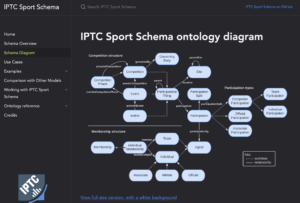
While XML served the industry well for many years, more recently developers and IPTC members have asked the Sports Content Working Group whether a standard would become available in a more modern serialisation format such as JSON, and whether knowledge graph protocols would be supported.
Because it is based on the W3C-standard RDF and OWL specifications, IPTC Sport Schema leverages the wide range of tools and expertise in the world of knowledge graphs, semantic web and linked open data, including the SPARQL query language, the JSON-LD serialisation into JSON format, inference using RDF Schema and OWL, and more.
“Using IPTC Sport Schema, sports leagues can choose to own their data,” said IPTC Managing Director Brendan Quinn. “Content publishers or sports leagues can publish open data on their website if they choose, in a way that can be re-mixed and re-used by others around the world.” IPTC Sport Schema can also be used for a more traditional model of aggregation and syndication by sports statistics providers who add value to the raw data being collected by sports leagues.
Like its ancestor SportsML, IPTC Sport Schema is created as a generic sports data model that can represent results, statistics, schedules and rosters across many sports. “Plugins” for specific sports extend the generic schema with specific statistics elements for 10 sports such as soccer, motor racing, tennis, rugby and esports. But the generic model can be used to handle any competitive sports competition, either team-based, head-to-head or individual.
As well as IPTC’s SportsML standard, the project is based on previous work by the BBC on its BBC Sport Ontology (some of its creators worked on this project). We have also consulted with and analysed related projects and formats such as OpenTrack and the IOC’s Olympics Data Feed format.
For more information on IPTC Sport Schema, please see the dedicated site sportschema.org, the project’s GitHub repository,
Those who are interested in the details can see an introduction to the IPTC Sport Schema ontology design, the full ontology diagram or full RDF/OWL ontology documentation,
There may be significant changes to the schema between now and when it is released as a fully endorsed IPTC Standard, so we don’t recommend that it is implemented in production systems yet. But we welcome analysis and experimentation with the model, and look forward to seeing feedback from those who would like to implement it in the real world.
People and organisations who are not IPTC members can give feedback by posting to the IPTC SportsML public discussion group or use the IPTC Contact Us form.